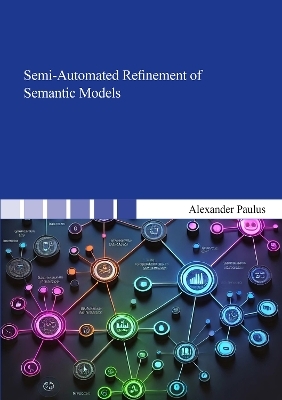
Semi-Automated Refinement of Semantic Models
Seiten
2024
Shaker (Verlag)
978-3-8440-9679-8 (ISBN)
Shaker (Verlag)
978-3-8440-9679-8 (ISBN)
Semantic models provide a formalized understanding of the contexts of datasets, facilitating a unified interpretation of data by both humans and machines. These models are an essential component of knowledge graphs and data exchange approaches such as dataspaces. While semantic models provide unique benefits in data documentation and access, the manual creation of semantic models is a time-consuming and tedious task that requires an in-depth understanding of semantic technologies.
This thesis proposes a semi-automated process for creating semantic models that emphasizes human involvement alongside the benefits of automation, rather than relying solely on full automation as traditional methods do. The proposed process is interactive and iterative, with manual model refinement playing a central role in improving the expressiveness and accuracy of semantic models.
A central contribution is the design of an approach to utilize historical semantic models to generate recommendations for model refinement. This system assists modelers by identifying and suggesting necessary additions to the semantic models, thereby enhancing their completeness and accuracy while promoting model consistency. A novel semantic modeling platform, named PLASMA, is presented that focuses on usability by non-expert modelers and integrates existing automation approaches. Additionally, this thesis examines the integration of large language models into the semantic modeling process, considering their advantages and potential drawbacks. This work represents a step towards more intuitive and effective tools for semantic modeling, especially for users with limited experience in semantic technologies.
This thesis proposes a semi-automated process for creating semantic models that emphasizes human involvement alongside the benefits of automation, rather than relying solely on full automation as traditional methods do. The proposed process is interactive and iterative, with manual model refinement playing a central role in improving the expressiveness and accuracy of semantic models.
A central contribution is the design of an approach to utilize historical semantic models to generate recommendations for model refinement. This system assists modelers by identifying and suggesting necessary additions to the semantic models, thereby enhancing their completeness and accuracy while promoting model consistency. A novel semantic modeling platform, named PLASMA, is presented that focuses on usability by non-expert modelers and integrates existing automation approaches. Additionally, this thesis examines the integration of large language models into the semantic modeling process, considering their advantages and potential drawbacks. This work represents a step towards more intuitive and effective tools for semantic modeling, especially for users with limited experience in semantic technologies.
| Erscheinungsdatum | 22.11.2024 |
|---|---|
| Reihe/Serie | Berichte aus der Informatik |
| Verlagsort | Düren |
| Sprache | englisch |
| Maße | 148 x 210 mm |
| Gewicht | 418 g |
| Themenwelt | Mathematik / Informatik ► Informatik ► Theorie / Studium |
| Schlagworte | Computer Science • semantic model • semantic technologies |
| ISBN-10 | 3-8440-9679-5 / 3844096795 |
| ISBN-13 | 978-3-8440-9679-8 / 9783844096798 |
| Zustand | Neuware |
| Haben Sie eine Frage zum Produkt? |
Mehr entdecken
aus dem Bereich
aus dem Bereich
was jeder über Informatik wissen sollte
Buch | Softcover (2024)
Springer Vieweg (Verlag)
CHF 53,15
Grundlagen – Anwendungen – Perspektiven
Buch | Softcover (2022)
Springer Vieweg (Verlag)
CHF 48,95
Eine Einführung in die Systemtheorie
Buch | Softcover (2022)
UTB (Verlag)
CHF 34,95


